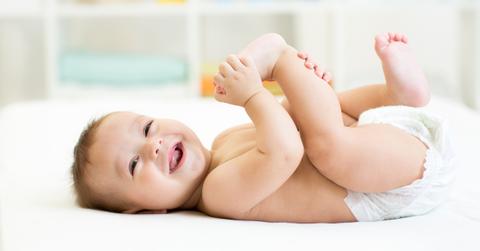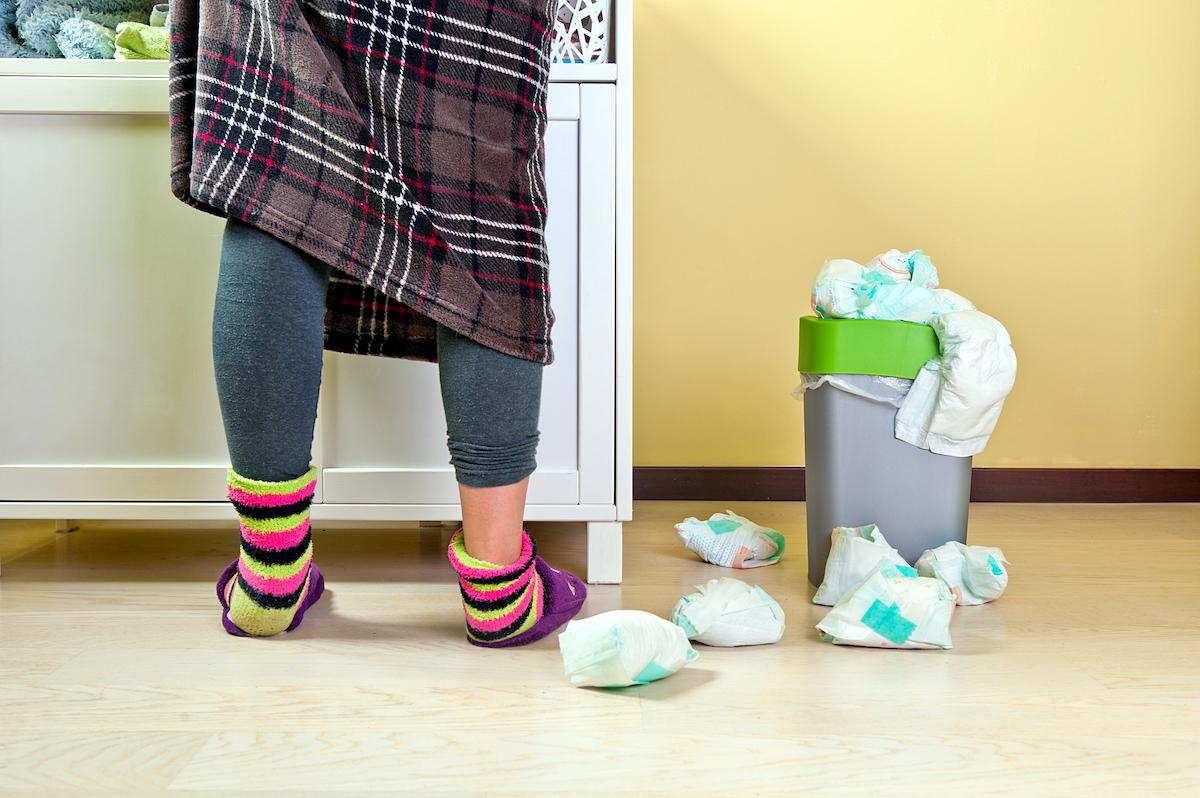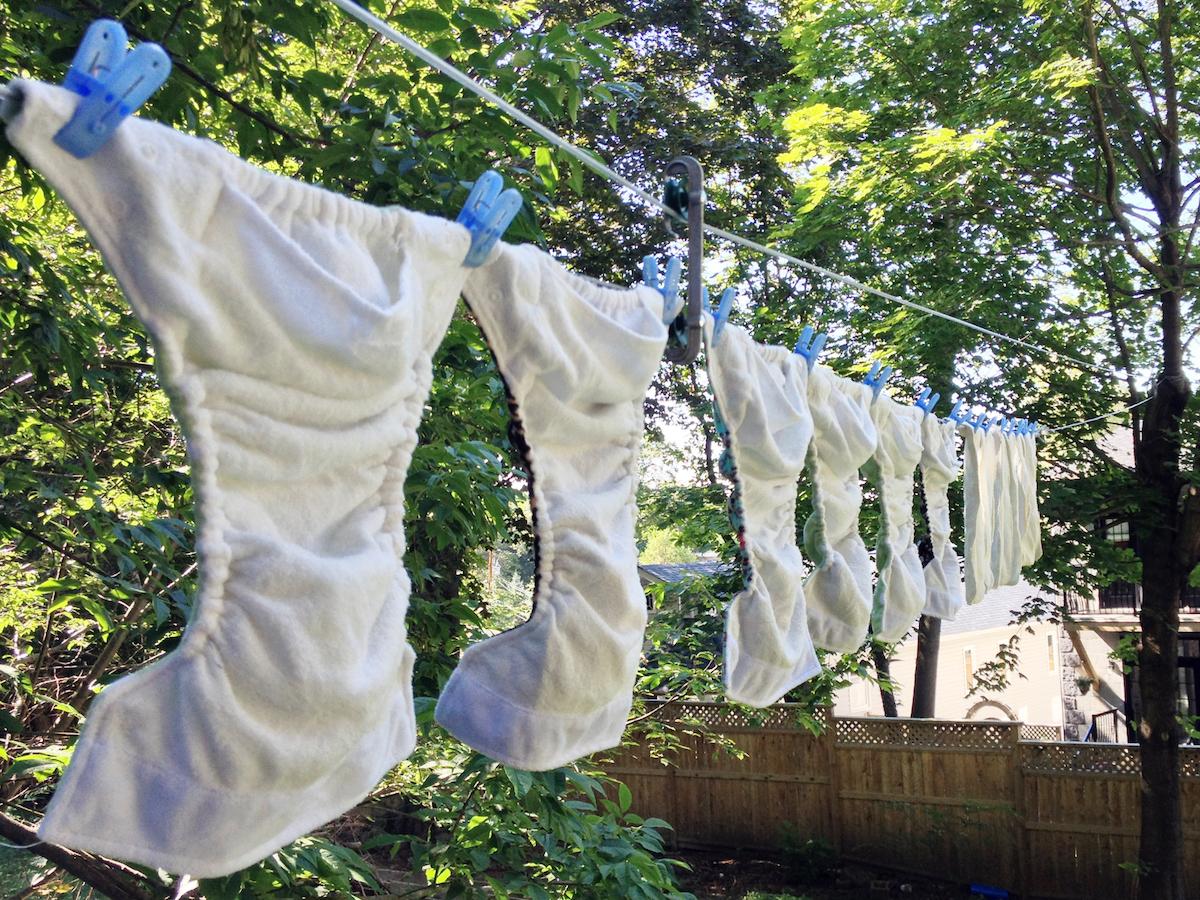Are Diapers Biodegradable? Here Are the Most Sustainable Diaper Options
Single-use diapers account for 2 percent of the U.S.'s landfill waste.
Updated Dec. 15 2022, 6:04 p.m. ET

If you’re a parent of a baby in diapers, you probably have a lot on your mind right now. One of those things is probably changing diapers — and another is probably the sheer amount of money you spend on them, and consequently, the amount of diapers you’re sending to the landfill. (And also, sleep. Remember sleep?)
But with all the waste diapers can cause, you may be wondering if there are biodegradable diapers out there.
Most babies use between 2,500 and 3,000 disposable diapers in just their first year of life, as per The Suburban Mom, and they continue requiring diapers until they are potty trained, running the total cost somewhere between $1,500 to $2,000 for diapers for one baby, on average. Not to mention, disposable diapers account for 2 percent of the U.S.’s landfill waste. That’s a whole lot of cash and trash.
Read on for everything you need to know about how diapers should be disposed of, what eco-friendly alternatives exist, and more.
Are diapers biodegradable?
Unfortunately, conventional single-use diapers are not biodegradable. When something is biodegradable, that means it is made from nature, and is able to break down naturally and turn back into soil. Single-use diapers are typically made from a variety of plastic-based ingredients, and plastic is not biodegradable.
According to the official SmartLabel for Pampers Swaddlers Newborn Diapers, ingredients of the popular diapers include: polypropylene/polyethylene, polyacrylate polymer, fluff pulp (derived from wood), polyester, thermoplastic polymers, petrolatum, stearyl alcohol, aloe barbadensis leaf extract, and fragrance — and many of those ingredients are petroleum-derived.
How long do diapers take to decompose?

It’s estimated that single-use diapers take 500 years to decompose in a landfill. And considering the fact that disposable diapers only hit the mass market in 1948, according to Mother Jones, not enough time has passed to know exactly how long diapers (and other plastic products) really take to break down.
Can you recycle diapers?
Diapers cannot be recycled, and typically, must be disposed of in the trash. The only plastics that can go in your curbside recycling bin are rigid plastics, like bottles and containers.
If you buy diapers in a cardboard box, that can be recycled with paper and cardboard; if your diapers come in plastic shrink wrap, check with your local grocery store if you can recycle it there with plastic bags.
Are biodegradable diapers better for the environment?
A popular alternative to conventional single-use diapers is single-use biodegradable or compostable diapers. In general, diapers marketed as biodegradable (or compostable) tend to use more sustainable materials and production methods than regular diapers, making them a bit more eco-friendly. But if they are not actually sent to a composting facility, then their impact is only very slightly better than regular diapers.
When companies put words like “pure” and “green” and “nature” and “eco-friendly” on their diaper packaging, they evoke that the product is sustainable and good for the planet. But this is greenwashing. In reality, most single-use diapers contain plastic, meaning they will wind up in the same place as your average Huggies — the landfill.
The world biodegradable gets tossed around a lot when talking about eco-friendly diapers. Some websites even offer lists reviewing “biodegradable” diapers, when in fact, many of the options on the list aren’t even marketed as biodegradable, but their packaging just gives off an eco-friendly vibe. For example, lists of “biodegradable” diapers companies often include Hello Bello, Seventh Generation, the Honest Company. This helps make consumers feel like those diapers will break down in the landfill, when in fact, these diapers all use plastic and will not break down for hundreds of years.
That said, some of these companies do take extra steps to make their diapers a little less terrible for the Earth before they hit the landfill; for example, by using some biodegradable materials, sustainably-harvested wood pulp, and keeping them free of chlorine and fragrance.
That all begs the question of whether any single-use diapers are actually compostable.
Can you compost biodegradable diapers?
Most diapers marketed as either biodegradable or eco-friendly cannot be composted, because they include various synthetic components. However, there are a few single-use diapers on the market that can be composted — typically, only in commercial or industrial compost settings, and not in home or backyard compost bins.
For example, DYPER offers a compostable diaper service called REDYPER, where parents can sign up for a regular delivery and pickup of biodegradable diapers. After the diapers are used, parents can seal up the used diapers and leave them outside for pickup (or mail them in, if pickup is not available in their area). Once the used diapers make it to DYPER's facility, the synthetic parts will be separated and disposed of, and the majority of the diapers will be composted.
The best biodegradable and compostable diapers:
Brands that offer diapers that can be composted include DYPER, Nest Diapers, and Bambo Nature. Remember, these cannot be composted conventionally, and must be composted in an industrial facility equipped to compost diapers.
Brands that make diapers that are mostly biodegradable, but still must be disposed of in the trash, include Andy Pandy, Coterie, and Eco Pea Co.
Do biodegradable diapers work?
Before buying new diapers for your baby, it’s always a good idea to read the product description and reviews to see what other parents have observed about the diapers. Diapers marketed as biodegradable or compostable can absolutely be as absorbent and secure as regular diapers — it just depends on the brand!
How long do biodegradable diapers take to decompose?
According to DYPER, compostable diapers take at least 14 weeks to decompose in a commercial compost setting.
But when any diaper is thrown in the garbage — whether it’s biodegradable, compostable, or conventional — it will wind up in a landfill, where it will take years and years to break down. The conditions in a landfill are not optimized to help trash break down, whether that trash is organic matter or plastic. According to The Balance, even paper takes two to six weeks to break down, and an orange peel takes six months to break down. And as noted by The Guardian, a biodegradable diaper can take 50 years to decompose in a landfill, all the while emitting methane, a harmful greenhouse gas.
50 years is a long time, but it's significantly less time than 500 years, which is how long it takes regular diapers to break down. So if single-use diapers are your only option, and you can afford biodegradable diapers (which are generally a bit more expensive), they'll be worth the extra cost, even if you do not have access to commercial composting and still need to send them to a landfill.
That said, there is a much more sustainable option than biodegradable diapers: cloth diapers.
Cloth diapers vs. biodegradable diapers

The most eco-friendly option when it comes to diapering your baby is to use reusable cloth diapers. Before stores began selling disposable diapers in 1948, parents used cloth diapers on their babies. Here are a few cloth diapering basics:
- Cloth diapers may seem more expensive than disposable ones at first, but keep in mind that they are an upfront investment that will allow you to save more money in the long run — especially if you have more babies and use the same reusable diapers for each child.
- When babies are first born, they can go through 10 diapers in one day — so if you own 10 diapers, you’ll need to do laundry every day; if you own 20 sets, every two days; if you own 30 sets, every three days; and so on.
- Cloth diapers may seem more wasteful, since you have to run your washing machine more often. However, the electricity and water you’ll use is far less than companies use in the production of disposable diapers — so using cloth diapers always has less of an impact than single-use ones, even if they are biodegradable.
- You can further lower the impact of cloth diapers by washing them with a non-toxic laundry detergent, hanging them to dry, and even buying them secondhand from someone who’s finished having babies.
- There are even some supposed health benefits to cloth diapers. For example, they are usually made from all-natural, breathable materials like cotton or bamboo, which can mean less irritation and diaper rashes for many babies, according to Children's Hospital Los Angeles.
For more information on cloth diapers (because there is so much to learn), check out these guides by Parents and Alpha Mom.
Diapering your baby is a personal experience, and it's important to find the method that works best for you. Luckily, there are so many ways to keep your baby routine sustainable these days, so don't hesitate to search the internet for tips on other ways to lower your waste in the nursery.
This article, originally published on Aug. 29, 2019, has been updated.